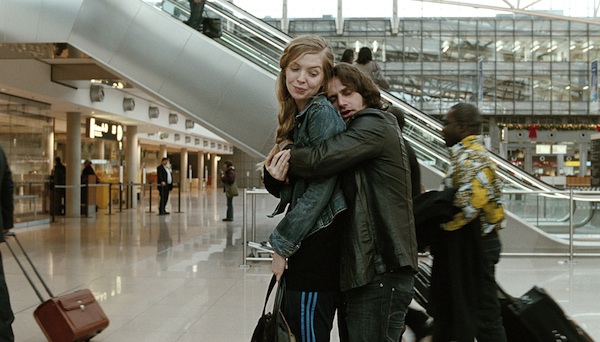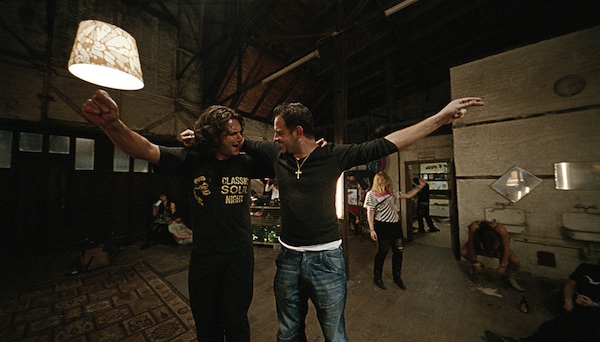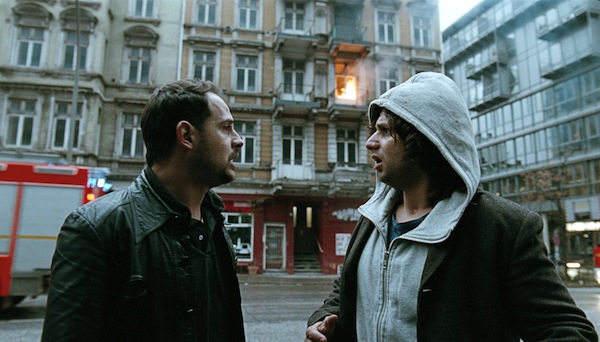

By Ray Pride Pride@moviecitynews.com
Interview: The Savory Sound of Fatih Akin’s Soul Kitchen
German director Fatih Akin’s narratives are filled with patterning of chance and cruel fate, as in his best-known films, the fierce Head-On and the more recent Edge of Heaven, with its cruel cross-cultural doubling of a pair of stories in Istanbul and Hamburg. But music has always been the heartbeat of his work, from his 1998 debut, Short Sharp Shock to the music-saturated documentary Crossing the Bridge: The Sound Of Istanbul. Part of the narcotic quality of Head-On‘s obsessive love story comes from the director’s love of all kinds of music, and knowing where it works best. Akin’s also a very good deejay; at the after-party for his latest, the sweetly farcical Soul Kitchen which opened the Thessaloniki International Film Festival last November, he spun until dawn, musically, physically, jumping wildly to his sonic handiwork. (See the bottom of the column for a dervish-ey moment from that night.)
There’s nothing tragic about Soul Kitchen, with food, sex and the gentrification of part of Akin’s hometown of Hamburg providing loopy complication after loopy complication, driven by an eclectic range of song selections. Akin describes the plot, which involves turning a working-class greasy spoon into a more savory restaurant like the tavernas he discovered on trips to the north of Greece, as a mix of Rocky, kung fu movies, American musicals and the neighborhoods he knows and loves but had never put on film, could take up this space and more. It’s good, it’s giddy, it’s generous, and just as filling on a second tasting months later.
Akin had the idea for his effortlessly cosmopolitan side of slapstick and yearning for a while, and he wrote it with his old friend Adam Bousdoukos based on a Hamburg hole-in-the-wall restaurant he had owned. Bousdoukos also stars as the calamity-struck lead, and the script draws on the pair’s mutual history, including Akin’s occasional back problems, which Bousdoukos gets to suffer, to slapstick result. “This was more than just a restaurant for us: it was a playground for adventure, a place to celebrate, a home,” Akin has written. “I wanted to capture that feeling and way of life that I so deeply connect with the Taverna [Bousdoukos’ place], and I wouldn’t have been able to do it had I been much older. I can’t party forever or go out on the town five nights a week anymore. At some point, you start to get head aches, you find the music too loud, you can’t handle all the smoke. We’re getting older, and that’s okay, because at some point this lifestyle simply disappears. Yet, making a film about it is still valuable because in the end it’s about an existential issue. It’s about drinking, eating, partying, dancing and about home. I wanted to make a film about home, not one that is defined by any nationality, not Germany or Turkey. Home not as a location, but as a state of being and an attitude.”
Part of the attitude is music, which is both architecture and pulse in Soul Kitchen, as Akin describes below. We spoke recently about how he works with music from the start of each project, as well as a nasty addiction known as “vinyl.”
AKIN: I had this experience in the past that I was shooting something, and editing something, and put some music underneath it and it really worked. I was falling in love with the music. But then later on, the music was too expensive, you see. Or the composer’s estate didn’t allow us to use it. And this was always very frustrating. It’s like you fall in love and then the girl doesn’t want to date you, something like that. I swore before I did Head-On, this time I will have all the music before. I collected all the tracks that I would use for the film. We asked how much they would cost and we put it in the budget. And, since then, I’ve worked like that, same with Soul Kitchen. I collected all this music, expensive music, I didn’t want to… Y’know, sometimes, you can [use covers of] music, it’s not exactly the same melody, two or three notes, you change them, but it sounds similar. I didn’t want to do that. I felt it was important to use the original music. I know how expensive it will be, but please put this in the budget and make a unique soundtrack with that.
PRIDE: And it’s a way to avoid potential heartbreak in the editing room when you have other things to think about.
AKIN: I had all the tracks beforehand. The best thing about this is when you know which music you will use in each scene, you can put all your songs in chronological order on a CD or two, and you can listen to these CDs. So what you have then is a chronological, emotional map of the film. You see? You can hear where the rhythm of the film will break down or where it doesn’t make sense. And you can open the script again and read the scene where the music doesn’t fit. Sometimes you see, we don’t need this scene, we can throw this scene out. It works better with it. It helps a lot for screenwriting and structuring the film.

PRIDE: That’s a terrific idea. It’s also striking how eclectic your mix of music is, you have the Greek music drop in, there’s an aria where you hear the scratched vinyl, it’s very much keyed to the melancholy, even sentimental mood of that scene. Exuberant or depressed or confused, you’ve got the emotional temperature through the music.
AKIN: Yes, exactly. Exactly. Like I said, it really is a map. I know that Sergio Leone worked that way, I read about it, that Ennio Morricone was producing and recording the music before they were shooting. And he had it on the set, and he could give the actors he feeling. You can do the same with the tracks. I mean, dancing is always difficult to [match to] songs. The best dancing in films are in American musicals, stuff like West Side Story. There, it’s perfect. But dancing in fiction films, it can be difficult. Spike Lee is quite good with that. But it was like, okay, how can we manage that? We had this electronic club scene, we had the music before. And I had a choreographer for the girl. He taught her some movements to the track. I said, I don’t like this movement, we changed it. When she came to the set, she was really choreographed, she knew the music. So we could shoot it with the music. Same thing with love scenes with dialogue. There is one scene at the end of the film where [two characters] are sitting in this snack bar. There is a very famous German song form the 30s in the background from Hanns Eisler. The emotional level of that song is the exact level between the actors. We could listen to the track while we were rehearsing the scene. When we rehearsed it, I let the song play and I knew that for me, personally, this would be a goose bump-maker.
PRIDE: How do you discover music nowadays? Do you still find interesting places to shop for music when you travel?
AKIN: I listen a lot to music on the Internet, actually Internet radio is an interesting source. Especially with jazz. You have so many jazz channels, like New York broadcasting stuff. Broadcasting companies from Chicago, all over the States, all over the world. I have some favorite channels for electronic music or for whatever. I listen to that, and if I like something, or something keeps, when I fall in love with it and I don’t know it, I don’t have a title and an artist and when I’m next to a record shop where I know I can find it, I go to those places or I order them through Amazon. I’m collecting still vinyl. Vinyl is like… Very important for me! I’m a collector with these things. I bought my first vinyl when I was like 10 years old, y’know. It’s my last sin, to spend money for vinyl I don’t smoke anymore, I quit smoking cigarettes, I quiet smoking weed, y’know. Stuff like that. I don’t have any sins anymore! So I spend money on vinyl.
PRIDE: I would have guessed that about you, that you would be a vinyl guy.
AKIN: Oh! I had not vinyl with me when I deejayed in Thessaloniki. I used to travel with vinyl and then I had this slipping disc thing and it makes no sense. I really try to work with deejay programs with laptops, but I still haven’t figured out how they really work. What I did was I copied all my vinyl to CDs and to the computer also. I have most of my vinyl on CDs so I can travel with the CDs to deejay. But at home? I’m a vinyl guy. That was since I was a kid.
PRIDE: Small music labels, jazz and electronic and indie rock are doing well for themselves doing vinyl now.
AKIN: When we do the soundtrack negotiations with the labels, the film’s done, companies come, record labels come, ask if we want to have a soundtrack, we have something in our contract. They have to press vinyl. The first time we did it was for Crossing the Bridge. We were forcing them to sue vinyl. We could not get through with that for Edge of Heaven because it was a too-small company that released it, but when we had Universal for Soul Kitchen, we’re like, ‘Okay, guys, it’s vinyl, or you don’t get the contract.’ And they did, they pressed I think 10,000 vinyls. It’s a double album. I’m very proud about that. I have the vinyl of my films at home, y’know! That’s the best thing about the filmmaking! I mean, one day I’m gone, y’know, but the vinyl will outlive me.
PRIDE: You’ll have to leave an archive, forget my scripts, forget my papers, you must preserve my vinyl!
AKIN: Exactly! Exactly! Exactly! When you have your soundtrack on vinyl, you’ve done it. Then you’ve done it! It’s like when Sinatra says, if you do it in New York you can do it everywhere. When you have it on vinyl, then you’ve got it. It’s a weird thing to be proud about… cos’ the goddam soundtrack’s on vinyl!
“Soul Kitchen” is playing in Los Angeles, New York, Philadelphia and Berkley and opens September 10 in Chicago and ten other cities and widens its run across the country into the fall. Photos: IFC Films, Ray Pride.

















Hai i m Surendra from india and i myself is a Film student and i love the music in Akin’s films its awesome we have another film maker in INDIA whose working method is similar to Akin It is Vishal bhardwaj.He is a great Director who is superb in Music and we have learnt alot from his scene designing skills which is quite similar to Akins Method.
Unfortunately I only had the chance to see Crossing the Bridge, fabulous film! For a sound-guy for fiction and documentary, it’s absolutely fantastic! can’t wait to see the others